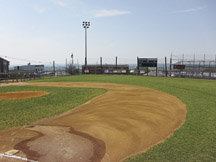Township looks to increase parking
At the North Bergen Commissioner’s meeting held on May 26, a resolution was passed that may allow North Bergen residents on 28th Street to have access to more parking.
According to Township Administrator Christopher Pianese, after reviewing the township’s tax maps they believed that a portion of land on 28th Street adjacent to the Toys R’ Us property belonged to the township. The resolution stated that the store accepted this conclusion.
“We’re considering doing parking on an angle as oppose to parallel to get more parking on that block,” said Pianese, explaining that he wasn’t sure when such a change would occur.
Commissioners also approved an ordinance that will eliminate the rank of deputy police chief. The cost saving measure was introduced at the May 12 meeting.
On Jan. 1, 2011 one of the deputy chiefs will be retiring, and another will retire the following January. The township does not plan to rehire for the positions.
NB schools receive funding
North Bergen will save $2.4 million when the state School Development Authority (SDA) provides 40 percent of the funding for facility projects at four of its schools.
Of the five Hudson County schools receiving the funds, North Bergen schools accounted for four of them and is among 111 schools throughout the state receiving $500 million in bonds by the New Jersey Economic Development Authority (EDA).
According to North Bergen Board of Education Business Administrator Steven Somick, four projects will be at the high school.
The first is for a guidance/nurse office addition to be built. It was estimated to cost $1.5 million, but due to a poor economy, the project should actually cost $1.25 million, said Somick. The state will contribute $671,000.
Masonry work was slated to cost $1.1 million, but the bid for the project came in at $583,000. The state’s share is $332,551.
The high school needs to switch out antiquated electrical components, which will cost $419,000, with the state spending $240,000 for the project.
Lastly, building a classroom for the high school’s Pathways program for handicapped students was estimated at $363,314, but the bid came in at $156,800. The state will contribute $90,944 to this project.
Lincoln and Franklin Schools will also have new windows installed. Lincoln and Franklin School’s projects are slated at $843,574 and $992,698 respectively, with the state paying $489,273 and $575,760, respectively.
Horace Mann School will have a retaining wall constructed. The project is slated to cost $185,850, with the state kicking in $77,993. Somick said that the district has yet to receive a bid for the project, so the cost will likely change.
Click it or Ticket underway
According to Patrol Commander Lt. James Somers, the Click it or Ticket program, which is funded by the national Division of Highway Safety, began on May 24 and will continue until June 6.
There are high-visibility check points in North Bergen, along with saturated patrols, to increase motorists’ awareness of the law requiring seatbelts. Violators will receive summons for not wearing a seatbelt, as well secondary offense summons if their backseat passengers are also not buckled in.
Somers said last year seatbelt usage in New Jersey increased to 92.67 percent.
North Bergen Police issued 379 summons for seatbelt violations and 16 for child restraint violations during last year’s campaign.
Senate approves Sacco sponsored items
The New Jersey State Senate has approved several measures sponsored by Sen. Nicholas Sacco (D-Hudson/Bergen).
The first was sponsored by Sacco and Sen. Sandra B. Cunningham (D-Hudson) and calls for a “plan of action” for increasing the clearance of the Bayonne Bridge from its current 151 feet to 215 feet, the current available air clearance under the Bridge of the Americas on the Panama Canal.
The resolution, which will now be given to various elected officials, including Gov. Christopher Christie, states that if the bridge is not modified, the New Jersey metro area will lose commerce to other ports once the Panama Canal expansion in completed in 2014.
Sacco also sponsored legislation that would require all newly-hired public employees in New Jersey to either live in the state or move within one year to comply.
Current employees living out of state are exempt from the residency requirement as long as they remain at their existing place of employment.
“Workers who collect taxpayer funded salaries and benefits in New Jersey should live here too,” said Sacco. “This legislation merely asks public workers to contribute to the same tax system that supports their livelihoods and requests that they hold a stake in the communities they serve.”
Sacco said that the bill, called the “New Jersey First Act,” was long overdue.
It would cover all state, county and municipal employees, as well as anyone working for a political subdivision of the state.
It does have an exemption for individual hardship situations, for which a three-member commission, appointed by the governor, senate president and assembly speaker, would ultimately decide.
It was passed by the Senate by 26-9, and now moves to the Assembly.
Bedbug bill passes assembly
A bill requiring landlords and tenants to address bedbug infestations was approved by 73-4-1 last Thursday by the Assembly.
Assemblywomen Joan M. Quigley (D-Jersey City) and Grace Spencer (D-Newark) sponsored it to provide more tools to deal with the hardy pest.
The legislation would make building owners responsible for maintaining their properties free of bedbug infestations. If an outbreak was reported, the landlord would be required to exterminate the pests at their own expense.
If they did not do so, they would face a $300 fine per infested apartment and $1,000 per infested common area. In addition, the local health board would be given the power to conduct exterminations and bill landlords who do not cooperate.
It would also require the Department of Health and Senior Services to create an informational pamphlet to educate renters about bedbugs, as well as their responsibility to notify their landlords if they are detected.
The bill will go to the Senate for further consideration.
